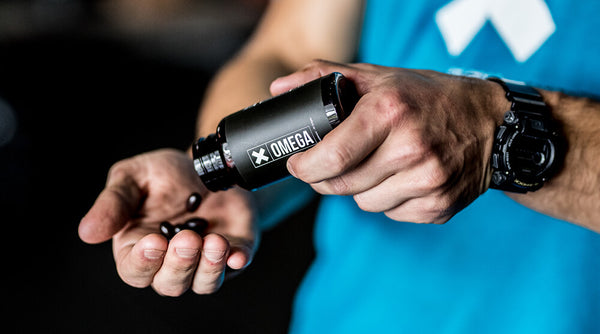It is recommended that a person should consume around 8 oz of seafood in a week. However, if you don’t consume the recommended amount of seafood, it is a good idea to consume a supplement that contains DHA and EPA. Today, krill oil is gaining popularity as an excellent alternative to fish oil and is being consumed as a supplement the world over.
Krill are tiny crustaceans that are mostly eaten by whales, penguins and other creatures of the sea. Krill oil, that is extracted from krill, is an excellent source of DHA (docosahexaenoic acid) and EPA (eicosapentaenoic acid), which are essentially the types of omega-3 fatty acids that are present only in marine sources. These fats play a very important role in the various functions of the body and have several health benefits.
Apart from omega-3 fats, krill oil also contains phospholipids, palmitic acid, stearic acid, myristic acid, the vitamins A, E B9 and B12, choline and astaxanthin (the antioxidant that imparts the red coloring to the krill and also helps to prevent the oxidation of the omega-3 fats).
Krill Oil vs Fish Oil
Bioavailability
Both fish oil, as well as krill oil, contain the omega-3 fats, EPA and DHA. However, in fish oil, these fats are bound to triglycerides, while in krill oil, they are bound to phospholipid molecules, which makes it easier for the body to absorb krill oil. Studies show that the body absorbs krill oil 68% better than fish oil and this increased bioavailability means that you need only around 2/3rd the amount of omega-3 fats from the krill oil compared to fish oil.
Astaxanthin Content
Krill oil contains astaxanthin, an antioxidant, and tocopherol, which help in preventing oxidation. Another great thing about krill oil is that it remains stable even when stored at a 100-degree temperature. Astaxanthin has several health benefits and studies show that this antioxidant has anti-inflammatory properties, improves the immune function and helps to lower DNA damage. Studies also reveal that astaxanthin plays a very vital role in cardiovascular health by decreasing triglycerides and increasing HDL or good cholesterol levels in the blood.
Sustainable Choice
Compared to fish oil, krill oil is a more sustainable choice as krill are found abundantly and also reproduce very quickly.
Safety
Krill oil is purer and safer to use compared to fish oil and since the krill has a very short lifespan and they are sourced from the deep waters of Antarctica, far away from any industrial pollution. The exposure of krill to toxins and chemicals is minimal, if not eliminated.
Learn more about Krill Oil vs. Fish Oil

Benefits of Krill Oil
As we already know, both fish oil, as well as krill oil, contain the omega-3 fatty acids DHA and EPA. The omega-3 fats in the krill oil are more bioavailable and easy for the body to use and since the omega-3 fatty acids are stored as phospholipid molecules in krill oil, they are easily absorbed into the bloodstream.
A few studies reveal that krill oil is more effective in raising the omega-3 levels in the body compared to fish oil and this could be because of the varying forms of omega-3 fats in both the oils. However, more studies are required to determine which of the oils is more effective and bioavailable.
Helps to Fight Inflammation
The omega-3 fatty acids present in the krill oil have anti-inflammatory benefits and so, krill oil may be an excellent supplement to fight inflammation. The pinkish-orange pigment contained in krill has powerful antioxidant and anti-inflammatory effects.
Krill oil combats inflammation in two ways. It reduces the CRP or C-reactive protein which helps to fight infections; however, when the levels of CRP increase, it produces inflammation. A study shows that people suffering from arthritis who took krill oil supplements showed significant reduction in CRP levels. Krill also helps to reduce inflammation by reducing TNF-a, which is an inflammation marker.
A study revealed that people with slightly raised lipid levels in the blood who took 1,000 mg krill oil supplements daily showed a significant improvement in the marker of inflammation and the krill oil supplement was more effective than 2,000 mg omega-3 supplements. Another study showed that people with chronic inflammation who took 300 mg of krill oil supplementation showed a reduction of inflammation by 30% after a period of 1 month.
May Help in the Reduction of Joint and Arthritis Pain
Krill oil has shown significant benefits in reducing inflammation and may improve joint pain and pain related to arthritis, which is caused due to inflammation. A study revealed that krill oil not only reduced the inflammation marker significantly but also reduced functional impairment, stiffness and pain in patients suffering from osteoarthritis and rheumatoid arthritis.
Another study revealed that adults suffering from mild knee pain who took krill oil supplements for 30 days experienced a significant reduction in pain while standing and sleeping. It also helped to increase their range of motion. Studies of effects of krill oil on mice with arthritis have also shown effects of reduced inflammation and swelling in the joints and improved arthritis scores. Krill oil has shown excellent potential as a treatment for joint pain and arthritis.
Can Improve Blood Lipid Levels and Heart Health
Omega-3 fats, especially EPA and DHA are considered to be healthy for the heart. Research shows that fish oil, as well as krill oil, can help to improve the lipid levels in the blood. Studies also reveal that krill oil may be particularly effective in reducing the triglyceride levels and also the other blood fat levels.
Studies reveal that krill oil helps to lower the LDL, or bad cholesterol, and triglycerides and can help to increase the HDL or good cholesterol levels. When compared to olive oil, krill oil can help to improve insulin resistance and also improves the endothelial (lining of blood vessels) function. Krill oil can also help in reducing high blood pressure, thus lowering the risk of stroke and a heart attack.
Can Help PMS Symptoms
Omega-3 fatty acids have been seen to be very beneficial in reducing pain and inflammation. Studies reveal that consuming fish oil and omega-3 supplements can help to reduce PMS (premenstrual syndrome) symptoms and also pain experienced during periods in women. Since krill oil also contains the same kind of omega-3 fatty acids, it can also help to relieve PMS symptoms such as depression, fatigue, irritability and mood swings and helped to reduce the use of painkillers.
Improves Brain Health
The omega-3 fatty acids DHA and EPA and phospholipids present in krill oil can help to protect the brain from oxidative damage and inflammation, which can help to reduce the risk of brain diseases such as autism, dementia, depression, schizophrenia and epilepsy. Krill oil also helps to fight the aging of the brain while boosting the cognitive function and positive memory.
Helps to Fight Depression
Eating seafood has shown great benefits in the treatment of depression symptoms and the high levels of DHA present in krill oil makes it an excellent remedy to fight the negative effects of depression.
Helps to Fight Diabetes
Krill oil can help to reduce the blood sugar levels and so helps to control diabetes and also reduces insulin sensitivity. A study revealed that people suffering from type-2 diabetes showed considerable improvement in their insulin sensitivity levels when they took a supplement of krill oil for 4 weeks.
Prevents Dry Eye
Dry eye is usually associated with low levels of omega-3 and krill oil supplementation can help to prevent dry eye. A study showed that participants suffering from dry eye who took krill oil supplements for 90 days, showed a reduction in inflammation and redness in the eye and improved tear production.
Helps in Reducing Symptoms of Colitis
When the colon is inflamed, the condition is known as colitis and krill oil supplementation can help to reduce the inflammation that causes colitis. The high antioxidant content in the krill oil also helps to fight the oxidative damage in the colon.
May Help in Fighting Obesity
The healthy fats present in krill oil block the endocannabinoid pathway that helps to keep you from feeling hungry. When you follow a low-fat, low-calorie and low-sugar diet, you may feel full but may not feel satisfied. Krill oil helps you to stick to a healthy diet and the fats in the krill oil help you feel full and satisfied and thus helps to combat obesity.
Dosage and Side Effects of Krill Oil
By taking krill oil supplements, you can increase your intake of the omega-3 fats, DHA and EPA. Krill oil is available widely and can be purchased at most of the pharmacies or it can be bought online. Typically, the krill oil supplements are much smaller in size when compared to fish oil supplements and they cause less fishy aftertaste or belching. However, the drawback with krill oil is that it can cost more than fish oil.
There are not many studies and so there is no recommended dosage for krill oil supplement consumption. However, since the omega-3 fats from krill oil are absorbed by the body at a higher rate compared to fish oil, ideally, just 2/3rd the amount of krill oil is sufficient. Also, typically, the recommended daily intake of EPA and DHA by the AHA (American Heart Association) together is around 250 mg to 500 mg and a 1000 mg capsule of krill oil contains 250 mg of the EPA and DHA and so you can have 1-2 capsules in a day depending on your requirement.
Also, it is a good idea to consult your doctor before consuming krill oil supplements, especially if you are pregnant, nursing or taking blood thinning medications, because, in high doses, omega-3 fats can have anti-clotting effects. Also, if you suffer from seafood allergy, you should avoid krill oil. Some of the common side effects that you may experience when consuming krill oil supplements include fishy breath, belching, upset stomach, headache, bloating and constipation or diarrhea.
Best Time to Take Krill Oil
Krill oil has shown great benefits in increasing the function of the joints, energy levels, mental clarity and focus, so it is a good idea to take the krill oil supplements the first thing in the morning, as this will allow your body to take complete advantage of the beneficial properties all through the day.
Things to Look for When Buying Krill Oil
When buying krill oil supplements, it is a good idea to do some research on the various brands and look for:
- Krill oil that is obtained from the waters of deep Antarctica. The krill from deep Antarctica are lower in heavy metals such as mercury and other toxins, which can be very harmful to your health.
- The nutrition details carefully. The krill oil should have at least around 250mg of EPA and DHA combined.
- Krill oil that contains phospholipids, are good fats and this is what sets krill oil apart from fish oil. Krill oil without phospholipids is not much more beneficial than fish oil and you are simply wasting your money.
- Krill oil that contains astaxanthin, is an excellent antioxidant and the higher the astaxanthin content, the better is the krill oil.
Sustainable Sourcing of Krill
Always buy krill oil supplements from a company that sustainably sources the krill oil from the waters of Antarctica. Sustainably sourced krill oil contains higher levels of omega-3 fatty acids, DHA and EPA. Not knowing where the krill oil is sourced from can put you at risk of consuming factory farmed fish that are exposed to heavy metals such as mercury, chemicals, hormones and other hazardous toxins. Krill sourced from the deep waters of Antarctica along with the short lifespan of the fish, minimizes exposure of the fish to toxins such as mercury and any industrial contamination making it safe for you to consume.
Today, krill oil is becoming extremely popular in the health circles as an excellent alternative to fish oil, while offering far more benefits with smaller doses, antioxidant properties, sustainable sourcing and almost no side effects. So, you could consider adding krill oil to your daily supplement routine for its amazing health benefits.
Learn more about Xwerks Omega

























